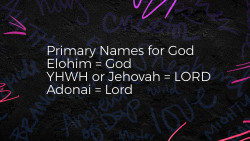What's in a Name? - Part 1
Sunday message.
What does it mean to truly trust God as our provider? Through Abraham's dramatic test of faith with Isaac, Pastor Jamie reveals how God calls us to radical obedience, even when asked to surrender our most precious blessings.
MP3 Audio
MP3 Transcript
View an A.I. generated full transcript of the audio.
Are you excited about it? I know that I am. I'm excited to be. First of all, I'm excited to be with you today. And if you're here for the first time, let me just encourage you as well that right outside of these doors is our connection center.
But you can also come see any of us people sitting beside you, because we are Ebeneezer and we're so glad that you're here to worship with us today. Now, I want to challenge you real quick before we get started. I want you to bow your heads. Just bow your heads and close your eyes. Because here's what I know.
Here's what I know to be true. Some of you came in here today and you're carrying the weight of the world on your shoulder. And here's the problem with that, is that in just a minute, we're going to break open the word of God. And we want God to speak to us, don't we? We want God to lead us, to direct us.
Sometimes holding on to those things creates a wall between what God wants to say and what I need to hear. And so I don't know about you, if you're joining us online, but if you'd be so willing, I'd love the chance right now to pray that whatever that is that's weighing on you, wearing you down, that God would lift that burden from you if you just lift your hand up, say, hey, that's me. I need somebody to pray for me today. Thank you. Say, I was right.
I knew. I know there's a few of you in here that maybe you just say, hey, I just got this. But some of you didn't want to raise your hand. Maybe you're like, I don't want to embarrass myself. That's okay.
Because here's the truth. God knows every single, single hair on your head, and he knows what's going on in your heart and your mind. And so, Father, as we sit here today ready to receive from your scripture, God. Not from me, from the word of God. I pray that whatever might be standing between us and you, and you've been able to speak, Lord, we lay it at your feet.
Lord, it could be some sin that we need to say, lord, I need you to forgive me and take this away. It may be a burden where you said that we needed to come and cast all of our care on you because you care for us, that to be anxious for nothing. But in everything, by prayer and supplication, with thanksgiving, let these requests be made known to you. And so, Lord, for those that raised their hands, and even those that did not God, I pray that whatever that burden is, would you lift it from them. In Jesus name, Amen.
I'm gonna. Hopefully, through this series, I want you to find hope in the name of God. See Acts 4:12. When Peter and John are standing before the Sanhedrin, he said, there is salvation by no one else, for there's no other name under heaven by which men must be saved. We have hope today because of who Jesus is.
He is our rock. The name of the Lord is a strong tower. The righteous run into it and are what they're safe. So whatever you've come into this room today, I hope that this message will challenge you to find a renewed hope that our God provides. In fact, if you're going to follow in the study guides, I want to go ahead and just let the cat out of the bag.
The first six blanks at the top. This is going to be the first title of God. We're going to talk about the names of God. What's in a name? This series is going to be an exploration of various places in the Old Testament where God was magnified by either an action or an attribute and was given a designation.
And today, the first one is this Jehovah, Jireh or Yahweh. Jireh. The Lord will provide.
Let that one sit for a minute. Now, some of you are like, I don't even know how to spell that. So it should be up on. If you're joining us online, Jireh is spelled in English, J, I, R, E, H. And you're probably wondering, like, well, wait a minute. Why'd you say Jehovah and Yahweh?
Well, I'm glad you asked. I think these girls down here on the front row asked me, why are you saying those two things the same? Didn't y' all ask that? See, she's so busy writing notes, she couldn't even look up. That's awesome.
We need to mimic that. She busy writing those notes. You see, in the scripture, in the Old Testament, there are four. First of all, in Hebrew, they only use consonants, they don't use vowels. And the covenant name of God we have come to know to be Jehovah.
Do you know why you say that word? Because most of you in this room either have or someone had a King James Bible. And when they began to translate the Bible, the word Jehovah came over from Latin. And that Latin word was based on the Jews. As they began to try to recreate you know, to write and copy their texts that the word Yahweh, those four consonants, God's name is holy, right?
Well, what they did is they took the other word for Lord in Hebrew, the vowels of Adonai, dispersed it into the consonants of Yahweh, and they came up with Jehovah. So we can thank the Latins language for why we say Jehovah. But when I say Yahweh or Jehovah, they're the same designation in your Bible. And I'm just going to assume some of you have never recognized this. But in the Old Testament, if you're reading along and it says L O, R D and that's in all capital letters, the Hebrew word is Jehovah.
If you're reading along and it says L O, R D and it's not all capitalized, it could have a capital L, or it could just be all lowercase. That's Adonai. And so there's three primary names that God is referred to. I mean, Lord is really a title. But we have Elohim, Yahweh, Adonai.
Those are the three words. If you look in your study guide there, you'll see those names written there. That we have Elohim, which is big G, God. We have Yahweh, which is L O, R D, all capitalized. And then we have Adonai, which is capital L, O, R, D. Everything we're going to study for the next few weeks are designations built usually upon those words.
In fact, here's a little bit more information for you. If you see a name or a place in the Old Testament that ends in a H, usually that's referring to Yahweh. If it ends in el, it refers back to Elohim or God. Let me give you an example. How many of you have ever taken and researched where your name came from?
All right, so you know what your name means. How many of you were named after somebody in your family? How many of you were named after where you were born? Like, I do know some people named can at Canyon because they were born in Colorado. I mean, like, there's.
There's all kinds of different names out there. Well, when Micah was coming along, I decided that the best people I could ask about naming my son was my youth group.
So we had a debate. I had settled on two names, or we. We had settled on two names, Micah and Andrew. So let me just go ahead and tell you if your name Andrew or Andy, you have the manliest name on the face of the planet because it literally means manly. So I had a kid in my youth group named Micah, and I had a kid in my youth group named Andrew.
And I had them debate who had the better name. We settled on Micah. They had nothing to do with them debating. It has to do with this. My name is Jamie Michael.
My first name is a derivative of Jacob, which we're going to talk about in just a minute. And my middle name, Michael, means who is like God. It's my dad's name. So what I did, we did, is I took my name, Jamie Michael, and I flipped it around. He's Micah James.
So he likes me on a scantron sheet a whole lot better. Five bubbles for each letter, right? For each name. You see, names matter, don't they? They have history.
So I'm going to give you some advice. When you're reading the Old Testament and you get to the genealogy, you're going, oh, my gosh, I can't read another one. Slow down and look at what those names mean. Those places like Beersheba, you're gonna like. What in the world is that?
Slow down and use some tools and find out why they called that place what they called it. In fact, if you look in Scripture, Genesis 2 and 3, the word Adam means humanity or human mankind. And Eve means living. So Adam and Eve are the genesis of living humanity. You skip on over.
This one's kind of. To me, it's oxymoronic. Abram. So if you don't know this, Abram's name was a B, R, A M. God later changes it to Abraham. Abram means exalted father.
So the moment he entered this world, they went ahead and called him Father. And at the time he leaves Haran, in Genesis 12, he is 75 and has no children.
Are you following me? You know why? Because it was a name of promise. When you get to Genesis 17, he changes his name to Abraham, which means father of multitudes. He was renamed based on the promise of God.
You look at his children, Isaac, which means he laughs. In Genesis 17, what you read is this story of three men coming to visit. They're about to go to Sodom and Gomorrah and destroy it. And they stop by and they tell Abraham, this time next year, when I come back through, you're gonna have a kid. Sarah's in the back and she hears this and she laughs.
Yeah, right, I'm old. She has him, Isaac, when she's 90 years old. And God had already told him what to name him. So when she names him Isaac, he laughs. Who's the he?
Who's the he that's laughing? It's God. Because he took a 190 year old lady and brought a kid into the world that was already past childbearing. See the promise? But wait a minute.
Not all names are positive. Not all names are positive. Later, Isaac has two boys and they're twins. One's named Esau and one's named Jacob. Where my name comes from.
So my name is really not a positive name. Jacob means supplanter. The Bible says when Esau came out, Jacob was holding his heel. It means trickster. Have y' all studied the life of Jacob?
He tricks Esau out of his birthright. He tricks his dad into blessing him, and then he tricks his father in all into multiplying his sheep. Not a positive name. Esau means hairy dudes in the room. How would you like your mama as soon as you came out and said, that boy was hairy?
I mean, he was so hairy that when Jacob tricks him, he takes hide and puts on his arms. So that when they. When Jacob or Isaac, when he's blind at this point goes, this has to be Esau, because he's really. He's hairy. He's a goat.
I mean, I've seen a couple of guys in bathing suits that might need to be named Esau. But later, the descendants of Esau become the Edomites. And Edom means red. What color was that stew he ate? See, all of it pointed back to the story that encompassed their life.
Let me tell you another quick. A quick one. This is just kind of. This is a sub sermon from where we're going in just a minute. In Genesis 22.
But at the beginning of First Samuel, the high priest is named Eli, and he has two sons, Hophni and Phinehas. And they're not very good boys. Samuel, who was born to Hannah, remember Hannah prayed for Samuel and said, if you'll give me a child, I'll give him back to you. Kind of put that in the back of your mind for later. If you'll give me a blessing, I'll give it back to you.
God. He ends up going and staying and being taught under Eli. But things aren't going well. By the time you get to First Samuel, chapter four, there's a big battle between the Israelites and the Philistines. And the Philistines win.
And in that battle they take the Ark of the Covenant. The Ark of the Covenant being where God's present dwelt. Hophni and Phinehas die because of that battle. And when Eli, their father, gets word that they're dead, he falls off a wall and he dies. So now the high priest and his two sons are gone.
Phinehas wife is pregnant, not Phineas and Ferb. This is a bad Phineas. Some of y' all got that. She has a child, and she names him Ichabod. Anybody in here named Ichabod?
I didn't think so. Anybody planning to name their child Ichabod? She named him Ichabod, saying the glory left. It left because the Ark of the Covenant's gone. And it left because its leadership died.
And there was mourning because they were under the oppression of the Philistines. And so Samuel steps into leadership, and he says, guys, we need to repent and turn back to God and put away these idols and come to him. Samuel was the last judge of Israel. And in Judges, you read that cycle over and over again. Israel would fall, they would repent.
God would rescue them. Yay, God. Thank you so much. And fall right back into it over and over and over again. And so they repent.
While they're doing this, though, over in the Philistine country, the ark that was a blessing to the Jews is a curse to them. Like, bad stuff's happening. They're like, get rid of this thing. And so they come back to the border and say, take this, please. We don't want it.
But they still have beef with Israel. So they get the ark back, and they're pleading to God for deliverance.
God shows up when the Philistine army comes, and a great boom thunder noise comes from heaven and it disperses. The Philistines and the Israelites chase after them, and they subdue them and defeat them. And. And the Bible says, under Samuel, the Philistines never stepped in foot into Israel's territory again. So they took a rock and they set it up at the site of that battle.
And they called that rock, Ebenezer, the Stone of Help. Because God fought the battle for them that day. Guys, we have a rock. His name is Jesus. Are you with me?
He is our stone of help. He is the one who has already provided for us all that we ever need and has no need of what we give. He is all sufficient, all knowing highly to be exalted and praised because of his power. Elohim. Elohim, used a couple thousand times in scripture, basically is not a plural of person as much as it is a plural of majesty.
The base word for God in Hebrew is el. In our language, el or eloha. Not that you're in Hawaii or anything. But when you put im the sound im on the end of El, you get Elohim. And that is God almighty, self sufficient above all things.
That God in Genesis 1:1 created the heavens and the earth. And what's interesting in the Hebrew language is that when it's used Elohim with a verb, the verb is constructed as if it's singular. That's why it's a plural of majesty. There's your Hebrew lesson for the day. That's a bit best I can give you.
They put that on there to exalt God above all gods. How many gods are there? Say it again. Deuteronomy 6:4. The great Shema says, hear, O Israel, the Lord is our God.
The Lord is. But you know what's beautiful? You know what's beautiful? When you go Back to Genesis 1:26 and 27. Let us make man our image according to our likeness.
Can I do some marital counseling with you today? If you're married, your marriage has the greatest opportunity to express the triune God to the world. In your home, in your family, in your community. That's why you need to work on your marriage. That's why you college students, that's why you need to be very picky about how you choose to marry.
I didn't get any amens out of that. We're helping you out so that 10 years down the road you get into this house, you're living with somebody that won't go to church with you, that's not doing faith life with you, and you're going like what in the world can I do? Well, make the choice now and be patient because God will bring you that man or that woman that you need.
Elohim yahweh, used over 6,000 times in the Old Testament. We see this in Genesis chapter 2. This covenant name of God and how he individually begins to craft man. In Genesis 1 you see Elohim. Elohim, Elohim.
Genesis 2 you see Yahweh and going from six days of creation. What you then see is God looking down, informing man from the dust of the ground, breathing life into him, that relational God. In fact, we see this very clearly at the burning bush. In Exodus chapter 3, God appears to Moses and tells him to take off his feet shoes because it's holy ground. And as the story unfolds, Moses is told to go back and ask Pharaoh to let his people go.
And Moses, because he's very insecure, says, well, who am I supposed to tell him sent me and God in his all sufficiency says, I am who I am.
The word for Yahweh in the Hebrew word to be are very, very similar. I am who I am. And you know what that demands from us? Some observation that. That I think that we need to really take into heart that God does not need anything.
Anything. There's nothing that you and I provide for God. Do y' all get that? Like, I think that's important to know, because sometimes we're like, well, you know, if I don't. If I don't obey God, I'm going to mess God's plan up.
You can't mess God's plan up because God doesn't need anything. In fact, Paul testifies to this to the Athenians In Acts chapter 17, when he says that God made the heaven and the earth and all that's in it. He doesn't dwell in temples made with hands, nor is he served by human hands as if he needed anything. In Psalm 50, verses 10 through 12, Asaph is writing and God is speaking, I don't even need your sacrifice. You are sacrificed.
And the priest may eat that meat, but I don't need it because of this. Listen. For every beast of the forest is mine. The cattle on a thousand hills. I know every bird on the mountains.
And everything that moves in the field is mine. If I were hungry, I wouldn't even tell you. For the world is mine and all it contains. Guys, can you agree with me that our Yahweh, our God, does not need anything?
He is our Adonai. He is our master, he is our ruler, he is our king. And those three primary words lay this foundation for us wanting to dig in and know more about this God who's above all things, no matter what I may be going through. You know why? Because God supplies all of our needs.
Knowing that God is supreme and has no need, then I have to flip that coin around to understand that God supplies all of my needs. We Talked about Philippians 4:19 A few weeks ago. And my God will supply all of his of your needs according to what his riches in glory. He echoes that in Second Corinthians 9, 8. And he says, and God is able to make all grace abound to you so that you, always having sufficiency in everything, may have an abundance for every good deed.
See, that's qualified a little bit. Our divine Provider provides for us so that we can do the good deeds that he's called us to do. And then Jesus in the Sermon on the Mount, he says, but if God so clothes, the grass of the field. How many of you got flowers on your table right now, and you just love to look at them, in about three or four days, they're gonna start wilting. If God so cares so much about the flowers to make them so beautiful, he says, how much more will he clothe you?
And see, here's the problem with us studying Jehovah Jireh, because you're sitting here today probably thinking, well, if God provides, then why hasn't he provided for me?
If God provides, then why are there people starving around this world today?
Where was God when I needed him most?
He just leave me. When I cried out to him, all I heard was crickets. If God is my provider, then why did he not provide for me?
Whew, that one sits heavy, don't it?
All of creation, according to Paul in Romans 8, groans inwardly for the redemption of the sons of God. That right now, right now, at this point in time and until Jesus comes back, there is the curse of sin evident in this world. Jesus provided a solution for our sin problem through his son, Jesus Christ. Yes or no? So I can be saved from my sin.
But the creation is yearning. It's longing for him to come back. And so we live in this tension. We live in this tension where God hasn't come back yet and suffering is evident in our lives. And it could be that the children of God to whom God has provided is a means by which they can be a blessing to others.
So before I preach anymore, would you mind standing with me? And I want us to look at just a few verses to get us started in Genesis chapter 22, give you a chance to stand up, stretch your legs a little bit.
I love this text, and I'll give some context once we read these few verses, but I want you to pick up with me in verse number 11. Verse number 11 says, but the angel of the Lord called to him from heaven and said, abraham, Abraham. And he said, here I am. He said, do not stretch out your hand against the lad Isaac, and do nothing to him. For I know.
I know now that you fear God, since you have not withheld your son from me, your only son. Then Abraham raised his eyes and looked. Behold, behind him was a ram caught in the thicket by his horns. And Abraham went and took up the ram and offered him for a burnt offering in the place of his son. And Abraham called the name of that place.
The Lord will provide, as it is said to this day, in the mount of the Lord, it will be provided. Father, speak to us as we dig into your text today, we love you and we surrender our hearts in Jesus name. Amen. So how can you and I today have hope? Have hope knowing that God is our Yahweh?
Jireh. What does that word, jireh, even mean? Well, the word jireh at its root comes from raah, which means to see. Our God sees exactly what we need. Our God knows our needs before we ever ask it, according to Jesus.
But yet out of his love and his benevolence for you and me, he provides for us because he sees us. He sees every one of us in this room. You go, how can somebody see that? Because he is the supreme God of the universe. He knows everything about you.
He knows everything about you. The Bible says when he formed you in the womb, he knew you.
And he knew the suffering.
He knew the suffering that you and I would endure in our life. But God wastes nothing. Whatever you're going through today, whatever your need may be, God sees it and he knows it. And he wants to provide for you, but he wants to provide in such a way to meet not just your immediate need, but to meet your future need. See, he said in the mount of the Lord, the Lord will provide.
His provision. Hasn't ended in Hebrew. You have perfect tense and you have imperfect tense. That's the way that verbs work. And this verb is in the imperfect.
It's not completed. Aren't you glad it's not completed? I mean, we're not like the deists of time past who believe God kind of took the world and created and spun it and went, okay, I'm done.
Some of our founding fathers that we refer back to their quote, unquote Christianity. That's what they believed. They didn't believe in a God that was present with his people. You need to read about the faith of some of our forefathers before you quote their Christianity. Because some of them didn't have it.
Sorry, I meddled on Wednesday night. I figured I'd meddle on Sunday morning too, you know.
But God had made promises to Abraham and God has made a promise to you that if you would believe in Jesus Christ, repent of your sin, what will he do? He'll save you. And that is a future hope, because we haven't left this world yet. We're trusting that because I'm saved someday, eternally, I'll be present with God forever. So I want us to consider Abraham for just a minute.
And we're going to pick up in verse number one says, now it Came about after these things. It was a. It was another of actually Abraham's tests that God tested Abraham. God tested Abraham and said to him, abraham. And he said, here I am.
In fact, Abraham's going to say those three words two more times. Here I am. Here I am. Here I am. You know what I found interesting about restudying Abraham's life?
He's a man of few words. Abraham doesn't say a whole lot. In fact, he only uses the word Yahweh four times. In all of Genesis himself, he uses Adonai. More interesting, isn't it?
Abraham interacting with this God who begins to make promises. In Genesis 12, God tells him, get up from your father's household, leave Haran, and go to a land. I will show you. And what did Abraham do? He got up and he left.
Radical obedience. When we get to Genesis 15, God reasserts that promise. I'm going to give you land. I'm going to give you descendants. In verse number six, Abraham believed God and it was credited to him as righteousness.
You fast forward to Genesis 17. And in Genesis 17, God reasserts it again. He researchs it again and calls him to cut a covenant.
Each time he reminds him, I'm going to give you land and I'm going to give you descendants. Over and over and over again, he's put to the test. And now he's putting him to one more test. Why would God do that? Did Abraham need to prove anything to God or did God already know where he stood?
In other words, can God look into your heart and my heart and kind of know? Okay, well, like, Fred's got, like, this much faith and look at, like, Micah and say, okay, but Micah's got this much faith. Can God do that? Does God already know? He does.
So the test is a revelation for Abraham as much as it is for anybody else. God already knows. God didn't need anything to be revealed for God's benefit, because God does not need anything. This was a test to reveal the Father of faith. You are going through a test right now.
Or if you're not, you're about to. Because God needs to show you where you stand in your faith. And what a great mercy that God would test us so that we can see where we stand and in the faith. Now, I don't know about you, but I think about the journey of my life, and I look back at these places in life where my test, my faith, was stretched, and I failed miserably. Anybody else in here willing to admit you failed miserably at the testing of your faith.
But you know what it revealed? It revealed how much I needed Jesus when he was interacting with the centurion. The centurion says, I believe, but help my unbelief. He recognized. I don't know what that capacity of faith has to be for God to act and move.
But God already knows what he's going to do. He's pulling us along in this journey to build our faith. And so he gives him this command. He says, take your son, your only son, whom you love, Isaac. Why did he say his only son was Isaac?
His only son? He wasn't. See, Abraham knew the one few times he did this. Twice he left the land because of famine. But one time, Sarah came up to him and said, you know what?
I'm getting tired of waiting on God to see what he's going to do. So here's my handmaid, Hagar. Go and have a child with her. God did not tell them to do that. And so he has.
Ishmael couldn't wait on God's plan, so he took it on himself. Anybody else ever do that? You just, you know, get tired of waiting on God to show up. So you just play God, right? We all do it.
And usually nine times out of 10, we make it worse than it was. You see, the testing of faith, point number one. Testing of faith calls us to radical obedience when we realize that we're in a test rather than going, oh, God, please take this off of me. I can't bear it anymore. What if instead we're able to renew our mind and go, okay, God, I'm in a test.
What is it that you need me to learn and to do? I used to have a guy who used to ask me all the time, well, what's God teaching you? In the trial, I'm like, did I stink? That's why he's teaching me. Well, no, he's teaching me how much I need his power and his direction and his wisdom to lead me through this.
But it requires a great obedience. And our father Abraham. Father Abraham had many sons. Many sons had Father Abraham. Y' all know that song?
I am one of them. And so, yeah, Ms. Kay is getting excited because this is what we teach kids. Father Abraham. Why is he our father? Because he's the father, Faith.
Y' all didn't know I could sing, did you? I just broke your brain. You see, he's the father of our faith. And he says, take your son, your only son whom you love, and go to the land of Moriah. Kind of put that one in the back of your mind for just a moment and offer him there as a burnt offering on one of the mountains of which I will tell you, all of us in our life have.
Isaac's and Isaacs are these things that God has blessed us with. Maybe it's our talents, maybe it's our time, maybe it's our treasure. But all of us in this room, can we agree, we're pretty blessed people. But here's the problem. When my blessing becomes my security blanket, and I won't let go of the temporary blessing, and when I don't let go of the temporary blessing, I can't see the bigger blessing God's got for me down the road.
All right, I just got your stuff then, didn't I? Do you understand what I'm saying? Here's Abraham, his son, his only son, the son of the promise. He sent Ishmael away because Isaac was born, to get him out of the house, because I'm putting all of my stock in this man right here. My son, my only son.
And God says, now I want you to go kill him.
Some of you in this room today have not yet experienced the greater blessing of God because you're still holding on to your Isaacs.
What would it look like if you emptied your hands of all of it?
You see, one author said this. It's not like Job. It's not an attitude like Job. Say, okay, Lord gives and he takes away. Well, I probably deserved it.
The Lord gives, takes away, and then he gives right back.
I remember a man telling my wife we were being commissioned years and years ago for something. And this man stopped when my wife came by as they were praying over us. And he said, he didn't do this to anybody else. And he told my wife, whatever you lose, I'll give back. Has he proven himself?
Does that mean. Has it been easy? No. God has proven time and time and time and time again that he is our provider. Right now, in your seat, you realize you have been tested.
But, you know, one of the greatest things to do while you're being tested is to be. Be thankful.
I'm still learning this lesson. I'm like you. I get. Sometimes I get to feeling sorry for myself and get wrapped up in the things that are coming against me. But the greatest exit out of those problems is to find thankfulness.
God is good. You may lose one thing, but you'll take your sight off the nine things that he gave you. And when we do that, and we get our eyes fixed on what is temporary we definitely take our eyes on what's eternal.
When I have that kind of attitude, God can speak down and say, I need you to do X, Y, or Z, and you'll be willing to go. You know what? Yes, sir. Sign me up. See, Abraham had a family test.
According to Warren Wiersbe, he had a family test. He left his father's land and loved ones. He had a fellowship test. When he got to Canaan, he separated himself from his nephew Lot, who was his immediate kin. Like he could have been the one through whom the descendants came.
Thank God he wasn't. That's another sermon for another day. The fortune test. He refused the wealth of the king of Sodom. After he helped rescue them.
He passed the fatherhood test. That. I mean, he had the fatherhood test, but he failed that one because he ends up having Ishmael. There was the faith test. I kind of added that one.
That from that point on, after God said, every male will be circumcised, they were circumcised.
And he had the farewell test. Because he had to send his child and Hagar away, Abraham sacrificed country, his family, his nephew, and his son. For what? For radical obedience. Guys, our obedience to the Lord will cost us something.
Can I ask you. Oh, wait a minute. It reminds me of a sermon I heard recently about a treasure in a field that a man found, and he buried it back in the hole and went away and bought the field and came back. So he had the field and the treasure.
Are you willing to. Are you willing to let go of your Isaac so you can see how God's going to provide for you for the next step? Because the second point in this is this. The trek of faith leads us to confident expectation. The trek of faith leads us to confident expectation.
That's a mouthful. Because first I need to define for you what a trek is. A trek is. Is an arduous journey, usually by foot. In other words, you're not calling up Uber and saying, hey, I need to get over there to the other side of Tekoa.
No, this is you journeying. And it's arduous. It's heavy. And so from that point where he said, I need you to go, Abraham, then according to verse number three, he saddles up the donkey, takes the wood and gets Isaac, and they leave. And they walk for three days because there was how many donkeys?
There's one. What probably was on the back of the donkey. The wood. And how old is Abraham? 100 plus.
Laura's granddad lived to be 100. One, he had a hip replacement at 85, and he was just at 99, getting to where the hip was giving him problems. He. He never stopped. I think he could probably run circles around most of us in this room today.
And here's Abraham. And now, again, back then, their lifespan was a little longer than us. He made this journey. Could you imagine what it was like?
Did Abraham get up and go, hey, Isaac, you might want to go kiss your mama goodbye?
Think about that for a moment.
What was going on in Abraham's mind? Moses didn't tell us. I believe Moses wrote this. Moses didn't tell us what was going on in Abraham's mind. Like, what was going on in Abraham's mind.
Well, thank God for the writer of Hebrews, because he reveals to us exactly, exactly what he says. If you look at Hebrews chapter 11, verse 17, Hebrews 11, chapter 11, verse 17, here's what we learn. Abraham believed that God could raise Isaac from the dead.
Is that what drove him through those verses of walking from his home to Moriah? What drove him? He knew that God would provide all of his needs. He brought Isaac into this world miraculously and somehow. He trusted.
In fact, look at what he says in verse number five. Stay here with the donkey, and I and the lad will go over there and we will worship and we will return to you. There is definitiveness in what he says he believed. I'll go over there, but I'm coming back. Let me say, say it like this, that Abraham went beyond Job's.
The Lord gives and the Lord takes away. He had his own. The Lord gives, the Lord takes away, and the Lord gives back. And when you and I see that our faith is leading us down a trek, a journey, a walk, we can do that with confident expectation. Why?
Because God always will provide.
And he knew that whatever was going to happen to Isaac, he didn't know. But how many of us know God's plan in the end? Do you know? Like, whatever journey you're on right now, do you know where that journey's gonna lead you? Does that mean you stop going on the journey?
Cause you don't have it all figured out. No, you don't. You walk because you know that God has your life in his hands. You walk because you know that God has already provided for you, will provide for you, and has a plan for ultimate provision in the end. And we as Christians live in great expectation of hope because we know that when we leave this world someday, if Jesus Christ is my Lord and my Savior, I'll stand before The Lord.
And he'll say, I know you. Does he know you? Does he know you? You're going, I don't know. Does he know me?
I'll tell you how he knows you. If you've repented of your sins and placed your faith and trust in Jesus Christ, the son of God, who died and was raised again, you're his.
If not, here's the problem. See, we treat God like that cosmic Santa Claus, right? He is our great provider. And we'll go to him and say, well, God, I need this. I need this.
I need this. I need this. Why is it that sometimes God doesn't give us what we ask for?
If you ask according to his will and in his name, he said he would give it. But if he doesn't know you, how can you ask in his name? You're left to your own devices. I'm serious. Like some of you in this room.
When you leave this world someday, you're going to stand before God and you're going to start rattling off how good you were. And Jesus is going to look at you and say, depart from me. I never knew you. You put your faith in yourself. How does that work for you?
How is that working for you if you put all of your faith and stock in yourself to fix all of your problems? Look at what happened with Hagar when they tried to go ahead and just skip the steps. How many of you ever tried to fix a car and you skip the steps and get down there and realize you left a bolt off? You ever done that before? I did that one time with my 1996 Silverado.
I was having to rebuild the axle. And in that axle there's a thing called a crush sleeve. And I didn't know about a crush sleeve. I didn't know what a crush sleeve was. But what you have to do is you had to turn this bolt tighter than it's supposed to be and then back it off.
I didn't know that I drove off without the crush sleeve being crushed. It sounded as horrible as it did before. I rebuilt the rear end. Don't skip the steps in the trek. Have confidence that God will meet your needs.
All along the way, if God's called you to do it, he's going to provide for it so that when you get there, point number three, you have the triumph of faith. That calls us to a humble realization. In the story, he puts the wood down and Isaac, because he's following the faith of his daddy, I'm going to trust you, dad. Now, he probably wasn't some little bitty kid like we picture, he was strong enough to carry wood like the donkey was. In fact, in that day, a lad would have been or a boy would have been somebody up to marrying age.
And Isaac doesn't get married. He's 40. So for those of you that are single, look, hold out hope. God provides.
He's about to slit his throat and then set him on fire.
And the confidence of Abraham carried over to the confidence in his son. It wasn't just Abraham's faith being tested. Isaac's faith was being tested too. And I wonder if, you know, you've seen paintings of this. And I kind of wonder if at that moment Abraham looked at him and said, I'll see you again, son.
Because we know from the writer of Hebrews, he believed that he could raise him from the dead. The triumph of faith calls us to humble realization. Sometimes this God comes along and he provides for us and we don't even see it. We're like a horse running on a track with the blinders on. And we don't see what's to our right and to our left.
And then God brings this awesome thing into our path and we go, oh, God, you had this in your hand all along, and I didn't see it. Humble realization. Look again at verse number 14. Abraham called the name of that place Jehovah Jireh. He didn't call God Jehovah Jireh.
He called the place Jehovah Jireh. And you know what's interesting about that? They were on Mount Moriah. And you know what Moriah means? The place that God will provide.
God from the very beginning of this journey already told you I'm sending to a place where I'm going to provide. So, so we know why Abraham looked at Isaac and said, God will provide for himself a sacrifice. Isaac said, where's the lamb? Where's the lamb? All along this, it's not just the journey of Abraham's faith, but of Isaac's faith.
So when Jesus comes along and says that he's the God of Abraham and Isaac and Jacob, that faith lineage passed right down through those. Why? Because it kept being modeled over and over and over again. The word Moriah is only used twice in the Old Testament. The other place that it's used was the 911 where Solomon built the temple.
Today it's the Dome of the Rock. And even the Muslims recognize this is the place where Abraham offered Isaac. Some of you are on a journey to a place where God is calling you to go and Offer your Isaac, whatever that is. It's a blessing God has already given you. It's not a bad thing.
But it's that place where you're willing to say, God, I surrender everything I have because you are my everything.
Has God brought you to that place? Because the last thing that we see here is this testimony of faith. This testimony of faith points us to the hope of future provision. Let me pick up in the text at 15. Josiah, if you want to come wherever Josiah is, if he wants to come on up and start playing, or Caleb.
Then the angel of the Lord called to Abraham a second time from heaven, and he said, by myself, I have sworn declares the Lord, because you have done this thing and not withheld your son, your only son, I will greatly bless you. The fourth time he's confirmed the promise of land and descendants. When Abraham died, guess what he did not have. He did not get to see all those descendants, and he did not possess the land. Someday Abraham's going to be raised from the dead and he will get to walk on the land that was promised to him by God because he has a future hope of provision.
You see, all the testing brought him to this point where God looked at him and said, I know that you fear God. Proverbs reveals to us that the fear of the Lord is the beginning of wisdom for you and I. Today, none of us in this room are Abraham. But aren't you glad that he set the pace for us? And in that story is this beautiful type as the Book of Hebrews talks about, that here was Abraham bringing his son and offering his son, and all along God had already made a provision of a ram, not a lamb.
But it takes me back to words like this in John 1, where John the Baptist looks and says, behold the Lamb of God who comes to take away the sin of the world. Or in Revelation 5, when no one was found worthy to open the scroll and they start looking and he says, behold, there was a lamb as having been slain from the foundation of the world, our Jehovah Jireh, our Lord the Provider, will provide all of our needs. And I know he does that because he sent his only son to take my place, to meet my ultimate need, which was to save me from my sin. Don't ask you to stand with me. I want you to bow your heads.
And I. I want to just challenge you. As you're thinking through the implications of this message, to think this some of us in this room, you have some sin in your life, and the sin in your life is keeping you from hearing from God. Clearly, some of you in this room may be lost. You might be joining us online. You've never put your faith and trust in Jesus Christ and trusted him to save you from your sins, to turn away from your old life and to walk in a new trek.
Is that you today?
Time to put that sin behind you so it keeps from holding you back. Some of you, God's blessed you so much, you don't want to let go of that blessing because you're afraid if you let it go that you lose everything. I'm telling you, there's some Isaacs in our life that we need to come and offer to the Lord so that he can lead us to that next step and show us just how much he can provide to take you from point A to point B. But what that doesn't mean that it won't be hard on Wednesday nights. We've been digging in some verses, and you know that saying where it says, God will never put more on you than you can handle?
How'd that work for Abraham? I think he did put more on him than he could handle. Every step of that journey those three days, God was probably having to pick his feet up because he was about to sacrifice the Son of Promise. Today, what is it in your life that Isaac, that you need to offer to the Lord, Say, lord, I'm giving you everything I have because you've already given me everything I have so that I can see what the provision is for the next step in my own life. And maybe some of you just need to come down to the altar and just offer up Thanksgiving.
God's provided so much for you and he's doing some good things in your life. I think the church needs to see people who have the joy of the Lord because the Lord is providing. They're walking that path of faith, and people are going like, wow, look at that guy. But man, he's got smile on his face and joy in his heart, and he's coming down here and just offering up a prayer of thanksgiving. Maybe that's today.
Not just what we ought to do, if that's what's happening, but maybe today. For those of you that are struggling, that offering of thanksgiving might be the very thing that breaks you out of the funk that you've been in. Father, speak to us. I've offered everything I think I know to do as an application from this. But Lord, you know the hearts of men and women in this room today, and you know what they need.
So I pray you speak to them. Grant their needs and work only what you can do. In Jesus name, amen.
More from the What's in a Name? Series
- What's in a Name? - Part 2 - El Shaddai: The Lord Almighty ... (September 14, 2025)
- What's in a Name? - Part 3 - El Elyon: The Most High God ... (September 28, 2025)
- What's in a Name? - Part 4 - Jehovah Rohi: The Lord My Shepherd ... (October 5, 2025)
- What's in a Name? - Part 5 - Jehovah Rapha: The Lord Who Heals ... (October 12, 2025)
- What's in a Name? - Part 6 - Jehovah Nissi: The Lord My Banner ... (October 19, 2025)
- What's in a Name? - Part 7 - Jehovah Mekoddishken: The Lord Who Sanctifies ... (October 26, 2025)
- What's in a Name? - Part 8 - Jehovah Shalom: God Is Peace ... (November 2, 2025)
- What's in a Name? - Part 9 - Yahweh Tsaba: The Lord of Hosts ... (November 9, 2025)
- What's in a Name? - Part 10 - El Olam: The Everlasting God ... (November 16, 2025)
- What's in a Name? - Part 11 - Jehovah Tsidkenu: The Lord Our Righteous ... (November 23, 2025)
Weekly Bulletin








